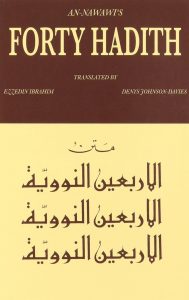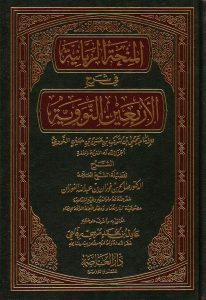Ahmad Farouk Musa & Haji Manan Razali || 7 Sept 2023
 This issue has been discussed by many critiques—Muslim and non-Muslims alike—since it is an issue of national interest especially when it involves the education system in Malaysia. But before going any further, we have to understand the meaning and significance of hadīth (plural: ahādith). Hadīth is the second authoritative cannon of Islam after the Qur’ān. We shall therefore provide a brief description of hadīth for the uninitiated. Linguistically, the Arabic word hadīth means to report a happening or to give the news. Hence, ahādith are meant as news brought by someone, which could also be a narration about an action of the Prophet or his companion (witnessed by the Prophet Muhammad), an event, or something in which the Prophet participated during his lifetime. Looking at its nature and origins, the term Ḥadīth refers to a tradition that was observed, recorded and narrated; essentially, hadīth is meant as a precedent that has the full approval of the Prophet himself. Some controversies arose concerning the status of the hadith since not all hadīth were authentic; some were fabricated. Such is not the case with the Qur’ān which constitutes the exact words of Allāh inspired upon the Prophet to be delivered to mankind. In the Holy Qur’ān, Allāh says:
This issue has been discussed by many critiques—Muslim and non-Muslims alike—since it is an issue of national interest especially when it involves the education system in Malaysia. But before going any further, we have to understand the meaning and significance of hadīth (plural: ahādith). Hadīth is the second authoritative cannon of Islam after the Qur’ān. We shall therefore provide a brief description of hadīth for the uninitiated. Linguistically, the Arabic word hadīth means to report a happening or to give the news. Hence, ahādith are meant as news brought by someone, which could also be a narration about an action of the Prophet or his companion (witnessed by the Prophet Muhammad), an event, or something in which the Prophet participated during his lifetime. Looking at its nature and origins, the term Ḥadīth refers to a tradition that was observed, recorded and narrated; essentially, hadīth is meant as a precedent that has the full approval of the Prophet himself. Some controversies arose concerning the status of the hadith since not all hadīth were authentic; some were fabricated. Such is not the case with the Qur’ān which constitutes the exact words of Allāh inspired upon the Prophet to be delivered to mankind. In the Holy Qur’ān, Allāh says:
“Behold, it is We Ourselves who have bestowed from on high, step by step (naz-zalna), this reminder: and, behold, it is We who shall truly guard it [from all corruption].”
[Sūrah al-Hijr; 15:9]
Muhammad Asad, in his magnum opus the Message of the Qur’an (the translation we rely upon in this writing) quoted al-Zamakshari, a Mu’tazili (rationalist) scholar with immense knowledge of the Qur’ān who said that the grammatical form of naz-zalnā implies a gradual revelation. But more importantly, he said that this prophecy has been strikingly confirmed by the fact that the text of the Qur’ān has remained free from all alterations, additions or deletions ever since it was enunciated by the Prophet in the seventh century of the Christian era; there is no instance of any other book, of whatever description, which has been similarly preserved over such a length of time. Early variants in the reading of certain words of the Qur’ān, occasionally mentioned by the classical commentators, represent no more than differences with respect to diacritical marks or vocalisation and, as a rule, do not affect the meaning of the passage in question.
Back to hadīth which refers to the recorded speeches and practices of the Prophet and serves as the basic source of legislation guiding the way of life of Muslims in their daily routines. Ḥadīth also provides various narratives of the Prophet’s biography (known as seerah) and his universal message. As a vital element of Islamic history, the development of hadīth has provided detailed information covering both the ethos and practices of Islam. Hadīth in itself consists of two basic elements: sanad or isnad (chain of transmission from the Prophet down the line to the narrator of the hadīth) and matan (the text or substance of the hadīth). While the attempts to surmise the real problem addressing such critical judgment relating to isnad are essential, the subsequent inquiry into assessing the theoretical objective pattern and precise criteria relative to the understanding of the textual message of hadīth is also of paramount importance. Consequently, both isnad and matan need to be considered when assessing the validity of a hadīth.
With regard to al-arba’in an-nawawiyyah or the forty hadith of An-Nawawi which is the bone of contention here, there is no issue with regard to either isnad or matan of all the forty-two ahādith in the book. They are all sound in both isnad and matan. So what is the issue then?
 The issue lies with the interpretation of some ahādith. To be more specific, hadith number 8. Since the Qur’an lays down the basic foundation and principles of Islam—in this instance, the freedom of conscience as in 2:256—no hadīthcould annul such principles. How do we then reconcile the perceived contradiction between the two? This is where the explanation by Prof Osman Bakar comes into play. It is the understanding of the circumstances in which the hadith was heard to be uttered. In the Islamic scholarship, this field is known as asbāb al-wurūd; it refers to discerning the specific circumstances that gave rise to a specific hadīth. This process entails deciphering the background involved in the textual comprehension and contextual interpretation of the sayings and practices of the Prophet. Commonly used in the discourse of the science of hadīth, asbāb al-wurūd is usually defined by the causation or relationship behind the emergence of a hadīth. Hence, the term asbāb al-wurūd is essentially a method to determine the intent of hadīth, which might be general in nature and thus require a specific meaning.
The issue lies with the interpretation of some ahādith. To be more specific, hadith number 8. Since the Qur’an lays down the basic foundation and principles of Islam—in this instance, the freedom of conscience as in 2:256—no hadīthcould annul such principles. How do we then reconcile the perceived contradiction between the two? This is where the explanation by Prof Osman Bakar comes into play. It is the understanding of the circumstances in which the hadith was heard to be uttered. In the Islamic scholarship, this field is known as asbāb al-wurūd; it refers to discerning the specific circumstances that gave rise to a specific hadīth. This process entails deciphering the background involved in the textual comprehension and contextual interpretation of the sayings and practices of the Prophet. Commonly used in the discourse of the science of hadīth, asbāb al-wurūd is usually defined by the causation or relationship behind the emergence of a hadīth. Hence, the term asbāb al-wurūd is essentially a method to determine the intent of hadīth, which might be general in nature and thus require a specific meaning.
In addition, there are primarily two approaches towards understanding hadith: textual and contextual. The textual approach refers to the understanding and application of hadīth when the clear meaning and related aspects are still in question. An example is linking the background of their occurrence and the need for understanding what is written in the text of the hadīth in question. On the other hand, the contextual approach of understanding hadīth is carried out beyond the text of hadīth, where there are instructions that require the hadīth in question to be understood and applied not according to their explicit or textual meaning but rather to their contextual understanding.
This demanding yet intriguing field of study is within the speciality of the sciences of hadith. How then could any school Ustaz or Ustazah who would be teaching al-arba’in an-nawawiyyah be expected to have enough mastery of the subject to explain it properly to their students? The issue here lies with the apparent contradiction with the basic eternal principle in the Qur’ān as quoted by Imraz:
“THERE SHALL BE no coercion in matters of faith…” [Surah al-Baqarah; 2:256]
In his explanation of this Qur’anic verse, Muhammad Asad contends that based on the strength of the above categorical prohibition of coercion (ikrah) in anything that pertains to faith or religion, all Islamic jurists (fuqaha’), without any exception, hold that forcible conversion is under all circumstances null and void; any attempt at coercing a non-believer to accept the faith of Islam is a grievous sin: a verdict which disposes of the widespread fallacy that Islam places before the unbelievers the alternative of “conversion or the sword”.
The seeming contradiction between the hadith number 8 and the verse in the Qur’an is probably best explained through asbāb al-wurūd of the hadith rather than the categorical rejection of the sound hadith itself. But are our religious teachers capable and well prepared for this level of explanation? This question begs an answer from the Minister of Education, if not the government itself. During our student days we were taught that the verses of the sword or qital (war) in the Qur’an have abrogated (nasakh) verse 256 in surah al-Baqarah above. This leads us to a bigger issue regarding the concept of abrogation in the Qur’an. We would like to stress here that we believe the overwhelming majority of Muslim scholars in Malaysia are of the same view as much as JAKIM, the so-called official defender of Muslim faith
 Our point is that we are uncertain how these school Ustaz and Ustazah would be teaching this particular hādith to their students, and which approach they would be using. Undoubtedly, they have not been trained how to deal with the ahādith in al-arba’in an-nawawiyyah. Moreover, the Ministry of Education and the Madani government have been quiet about this crucial issue except by saying in hindsight that the hadīth will be taught only to Muslim students. But somehow that announcement does not auger well to many people. Our personal opinion is that such a policy is misguided and counter-productive; we should not rush through it without a clear study and perhaps a dialogue with the stakeholders. Sadly, our national schools have lost their sparkle in pulling other races into embracing a national curriculum which is increasingly seen as too Malay- and Islam-centric, and not as secular as it used to be during the good old days when Azman, Balan and Choon could sit side by side and study together harmoniously.
Our point is that we are uncertain how these school Ustaz and Ustazah would be teaching this particular hādith to their students, and which approach they would be using. Undoubtedly, they have not been trained how to deal with the ahādith in al-arba’in an-nawawiyyah. Moreover, the Ministry of Education and the Madani government have been quiet about this crucial issue except by saying in hindsight that the hadīth will be taught only to Muslim students. But somehow that announcement does not auger well to many people. Our personal opinion is that such a policy is misguided and counter-productive; we should not rush through it without a clear study and perhaps a dialogue with the stakeholders. Sadly, our national schools have lost their sparkle in pulling other races into embracing a national curriculum which is increasingly seen as too Malay- and Islam-centric, and not as secular as it used to be during the good old days when Azman, Balan and Choon could sit side by side and study together harmoniously.
Consequently, we have taken great pains to explain and clarify this hadith number 8 below so that it may not be misconstrued and misapplied.
This hadith which was actually taken from Imam Bukhari’s collection of authentic Hadith no. 2946 has raised a lot of anxiety among both Muslims and non-Muslims alike. It reads as follows:
Allah’s Messenger said “I have been ordered to fight against the people until they testify that there is none worthy of worship except Allah and that Muhammad is the Messenger of Allah, and until they establish the prayer and pay the zakat (i.e. purifying dues or obligatory charity). If they do, then they will gain protection from me for their lives and property, unless (they commit acts that are punishable) in Islam, and their reckoning will be with Allah.” [Sahih Bukhari, no. 2946]
The hadith is about the Prophet’s stern warning to the hostile infidels or non-believers during his time. It is believed that the specific circumstances that gave rise to this hadith is his complementing response to the revelation of the Declaration of Disavowal by Allah that is recorded in surah At-Taubah, verses 1-15 of the Qur’an which took place in the month of Zulqa’edah during the 9th year of Hijrah.
At the time of its revelation, the Muslim army had just returned to Madinah from the arduous Tabuk Expedition in the scorching heat of summer across a distance spanning close to 1,400 km to fend off a potential attack by the powerful Byzantine Empire, and the pilgrims’ caravan had left Madinah for Makkah to perform their first Hajj (i.e. major pilgrimage).
Makkah had just been conquered a year earlier by the Prophet and although its people were now Muslims and Islam was already dominant in North Arabia, the infidels who were living outside Makkah were bitterly sore with the rising force and power of Islam, and were looking for opportunities to attack the Muslims.
As such, what the Prophet said in this hadith must be clearly understood in the specific context of the prevailing circumstances at that time when the Muslims were facing serious threats from hostile hypocrites and non-believers.
However, the hadith is not relevant and applicable in our current circumstances where Muslims and non-Muslims live peacefully side by side, joining hands to build a nation together while mutually respecting each other’s faith without hostility. Applying the hadith broadly, literally and indiscriminately is out of context and contravenes the following verses of the Qur’an:
- “There shall be no compulsion in religion.” [Al-Baqarah; 2:256].
- “As for those (among the disbelievers) who do not fight you nor drive you out from your homes because of (your) faith, Allah does not forbid you from showing them kindness, and acting (courteously and) fairly towards them; for verily, Allah loves those who are (fair and) just. Allah only forbids you from making allies with those who fought against you, drove you out from your homes and aided in your exile over matters concerning your religion. Whoever takes them as allies is committing gross injustice.” [Al-Mumtahanah; 60:8-9]
The following passage is the translation of the Declaration of Disavowal taken from The Message of the Qur’an by Muhammad Asad:
Surah At-Taubah (Repentance); 9: 1-15.
9:1
DISAVOWAL by God and His Apostle [is herewith announced] unto those who ascribe divinity to aught beside God, [and] with whom you [O believers] have made a covenant.
9:2
[Announce unto them:] “Go, then, [freely] about the earth for four months–but know that you can never elude God, and that, verily, God shall bring disgrace upon all who refuse to acknowledge the truth!” (9:3) And a proclamation from God and His Apostle [is herewith made] unto all mankind on this day of the Greatest Pilgrimage: “God disavows all who ascribe divinity to aught beside Him, and [so does] His Apostle. Hence, if you repent, it shall be for your own good; and if you turn away, then know that you can never elude God!”
And unto those who are bent on denying the truth give thou [O Prophet] the tiding of grievous chastisement.
9:4
But excepted shall be – from among those who ascribe divinity to aught beside God–[people] with whom you [O believers] have made a covenant and who thereafter have in no wise failed to fulfil their obligations towards you, and neither have aided anyone against you: observe, then, your covenant with them until the end of the term agreed with them. Verily, God loves those who are conscious of Him. (9:5) And so, when the sacred months are over, slay those who ascribe divinity to aught beside God wherever you may come upon them, and take them captive, and besiege them, and lie in wait for them at every conceivable place! Yet if they repent, and take to prayer, and render the purifying dues, let them go their way: for, behold, God is much-forgiving, a dispenser of grace.
9:6
And if any of those who ascribe divinity to aught beside God seeks thy protection, grant him protection, so that he might [be able to] hear the word of God [from thee]; and thereupon convey him to a place where he can feel secure: this, because they [may be] people who [sin only because they] do not know [the truth].
9:7
HOW COULD they who ascribe divinity to aught beside God be granted a covenant by God and His Apostle, unless it be those [of them] with whom you [O believers] have made a covenant in the vicinity of the Inviolable House of Worship? [As for the latter,] so long as they remain true to you, be true to them: for, verily, God loves those who are conscious of Him.
9:8
How [else could it be]? -since, if they [who are hostile to you] were to overcome you, they would not respect any tie [with you,] nor any obligation to protect [you]. They seek to please you with their mouths, the while their hearts remain averse [to you]; and most of them are iniquitous. (9:9) God’s messages have they bartered away for a trifling gain, and have thus turned away from His path: evil, behold, is all that they are wont to do, (9:10) respecting no tie and no protective obligation with regard to a believer; and it is they, they who transgress the bounds of what is right!
9:11
Yet if they repent, and take to prayer, and render the purifying dues, they become your brethren in faith: and clearly do We spell out these messages unto people of [innate] knowledge! (9:12) But if they break their solemn pledges after having concluded a covenant, and revile your religion, then fight against these archetypes of faithlessness who, behold, have no [regard for their own] pledges, so that they might desist [from aggression]. (9:13) Would you, perchance, fail to fight against people who have broken their solemn pledges, and have done all that they could to drive the Apostle away, and have been first to attack you? Do you hold them in awe? Nay, it is God alone of whom you ought to stand in awe, if you are [truly] believers!
9:14
Fight against them! God will chastise them by your hands, and will bring disgrace upon them, and will succour you against them; and He will soothe the bosoms of those who believe, (9:15) and will remove the wrath that is in their hearts. And God will turn in His mercy unto whom He wills: for, God is all-knowing, wise.
 Dato’ Dr Ahmad Farouk Musa is the Founder and Director of Islamic Renaissance Front and a founding member of Muslim Professionals Forum.
Dato’ Dr Ahmad Farouk Musa is the Founder and Director of Islamic Renaissance Front and a founding member of Muslim Professionals Forum.
 Haji Manan Razali is a co-founder of Islamic Renaissance Front and a founding member of Muslim Professionals Forum.
Haji Manan Razali is a co-founder of Islamic Renaissance Front and a founding member of Muslim Professionals Forum.

